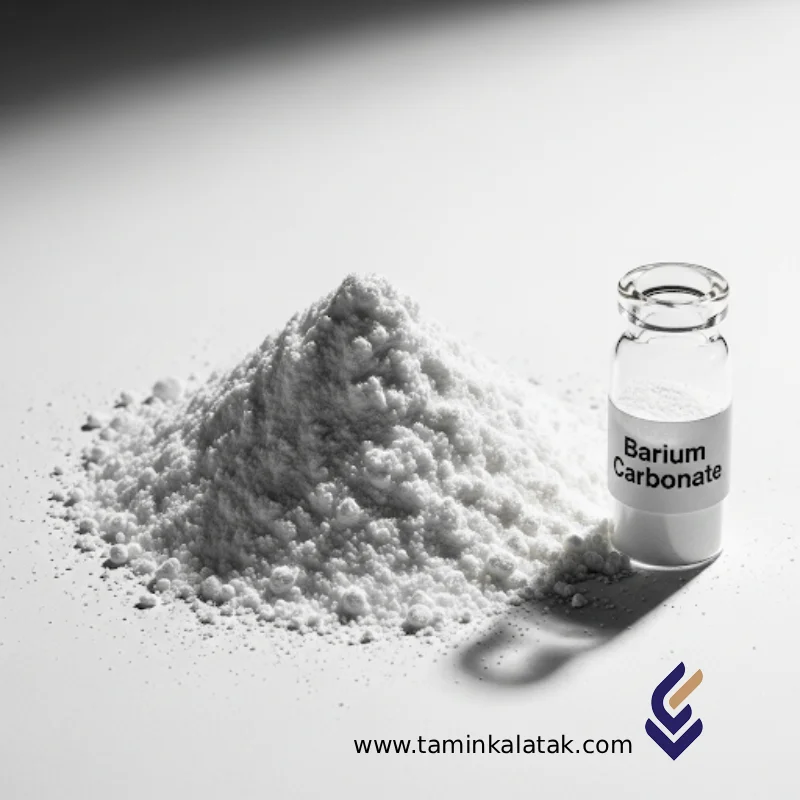barium carbonate
Barium Carbonate is a white, odorless, crystalline inorganic compound widely used in various industries due to its distinct physical and chemical properties. It occurs naturally in the mineral Witherite and is considered one of the most important barium compounds in industrial applications.
Thanks to its stability and reactivity characteristics, Barium Carbonate finds applications in glass manufacturing, ceramics, refractory brick production, pigments, metallurgy, and even water treatment. However, because of its high toxicity, strict safety measures are required when handling or transporting this substance.
Chemical Structure
Barium Carbonate is an ionic mineral salt composed of barium ions (Ba²⁺) and carbonate ions (CO₃²⁻).
| Property | Description |
|---|---|
| Chemical Formula | BaCO₃ |
| Crystal System | Orthorhombic |
| Chemical Classification | Inorganic Carbonates |
| Key Characteristic | Highly stable under normal conditions but decomposes rapidly in contact with acids, releasing CO₂ gas. |
This robust crystalline structure contributes to its thermal and chemical stability, making it particularly valuable in high-temperature and industrial chemical processes.
Physical and Chemical Properties
| Property | Value / Description |
|---|---|
| Chemical Name | Barium Carbonate |
| Chemical Formula | BaCO₃ |
| Molar Mass | 197.34 g/mol |
| Appearance | White, odorless powder or crystals |
| Solubility | Insoluble in water; soluble in acids with CO₂ release |
| Thermal Stability | Stable under ambient conditions; decomposes upon heating |
| Toxicity | Highly toxic if ingested or inhaled |
| Crystal Form | Orthorhombic structure |
| Reactivity | Reacts with acids; inert in neutral or alkaline media |
Applications
-
Glass Manufacturing: Enhances clarity, mechanical strength, and reduces UV and X-ray transmission in specialized glasses.
-
Ceramics and Glazes: Improves thermal resistance, surface gloss, and prevents crack formation in finished products.
-
Water Treatment: Removes sulfates and other unwanted ions, particularly in hard water purification.
-
Refractory Brick Production: Increases thermal shock resistance and mechanical durability of high-temperature materials.
-
Metallurgy: Acts as a flux and refining agent in processing non-ferrous metals like copper and aluminum.
-
Paints and Pigments: Serves as a filler, pigment stabilizer, and color enhancer.
-
Pyrotechnics: Used in certain firework formulations as a stabilizer and burning control additive.
Advantages
-
Exceptional industrial versatility across multiple sectors.
-
High thermal stability and resistance to decomposition at elevated temperatures.
-
Improves mechanical and optical quality of glass and ceramic products.
-
Effective in removing sulfate ions and impurities during water treatment processes.
Limitations
-
Toxic compound: Hazardous if swallowed or inhaled; requires strict safety handling.
-
Environmental risk: Contamination of soil or groundwater can cause severe ecological harm.
-
Restricted use in food or pharmaceuticals due to its toxic nature.
Safety and Storage
-
Storage Conditions: Keep in a dry, cool, and well-ventilated area, away from moisture and acidic materials.
-
Personal Protection: Use respiratory masks, gloves, and protective goggles when handling the powder.
-
Transportation: Must comply with GHS and international regulations for toxic materials.
-
Emergency Procedures:
-
Skin or eye contact: Rinse immediately with plenty of water.
-
Ingestion: Do not induce vomiting; seek medical assistance immediately.
-
Environmental Impact
While Barium Carbonate is only slightly soluble in water, its release into the environment in large quantities can lead to water contamination and aquatic toxicity. Proper waste management and containment are essential to prevent environmental hazards.
Substitutes for Barium Carbonate
Due to toxicity concerns, safer alternatives are used in certain industries:
| Substitute Compound | Typical Application | Remarks |
|---|---|---|
| Calcium Carbonate (CaCO₃) | Glass and ceramics | Economical and non-toxic alternative |
| Strontium Carbonate (SrCO₃) | Pyrotechnics, ceramics | Similar properties, less toxic |
| Barium Sulfate (BaSO₄) | Paints, coatings, medical uses | Non-toxic and environmentally safe |
Summary
Barium Carbonate (BaCO₃) remains an essential industrial chemical for glass, ceramics, metallurgy, and pigment production, valued for its stability, heat resistance, and ion-removal capabilities.
However, its toxicity demands strict safety controls and environmentally responsible management throughout its lifecycle — from storage and handling to waste disposal.
Applications
| Applications | , , , , |
|---|
barium carbonate
| Products | Chemical formula | CAS number | Grade | Vapor pressure | Solubility in water | Melting point | Physical appearance | Density (at 20°C) |
|---|---|---|---|---|---|---|---|---|
| Barium carbonate | BaCO₃ | 513-77-9 | Analytical grade، Technical grade، High purity | None (non-volatile solid) | Very slightly soluble (about 0.002 g/L at 20°C) → practically insoluble | About 811°C (decomposes before melting to BaO + CO₂) | White, odorless powder or crystals | 4.29 g/cm³ |







